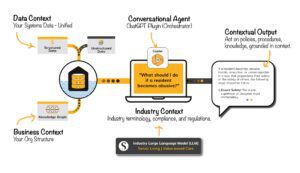The following is a guest article by Tisson Mathew, Founder and CEO at SkyPoint AI
Why Large Language Models Trained on Industry Context are Essential for Effective Generative AI in the Healthcare Space
Ask ChatGPT an important but complicated healthcare-related question, and you might very well get a wrong—and potentially dangerous—answer. Navigating the complexities of medical data, regulations, and patient care can place demands on generative AI technologies that can’t be fulfilled. But there is a way to take full advantage of the power of GenAI — with industry-specific LLMs that are securely supplied with proprietary data.
This is where industry-specific large language models emerge as the core differentiator for industry-applied AI solutions, serving as a bridge between the promise of AI and the intricate landscape of healthcare. At SkyPoint, our mission centers on developing AI solutions that not only comprehend but also respect the intricate nuances of value-based care. Our healthcare-specific models undergo specialized training to grasp medical terminology, adhere to rigorous ethical standards, and navigate the ever-evolving regulatory landscape. This targeted customization not only enhances the quality of AI-generated content but also fosters trust among healthcare professionals and patients alike.
Why Training Industry-Specific Large Language Models Matters
At the heart of this transformation lies the critical component of training industry-specific large language models in the healthcare context. The challenges of medical terminology, diverse patient scenarios, and regulatory intricacies demand an AI that can understand, adapt, and generate content that aligns precisely with healthcare norms. Generic large language models, although impressive, lack the domain expertise required to navigate these complexities effectively.
Deploying an out-of-the-box generic large language model in healthcare can result in inaccurate and contextually inappropriate content. The nuances of medical language and the subtle variations in meaning based on medical context are often lost in translation, potentially leading to misdiagnosis, incorrect treatment plans, and misinformation. Regulatory compliance and ethical considerations unique to healthcare can also be overlooked by models without specialized training.
Ensuring Ethical and Regulatory Compliance
Addressing the concerns surrounding privacy and data security in healthcare AI applications is paramount. Industry-specific models offer a solution by being meticulously trained to adhere to the intricate web of healthcare regulations. By immersing these models in vast datasets, they learn to discern sensitive patient information, ensuring that patient confidentiality remains uncompromised. For developers, ethical considerations should always form the cornerstone of any AI development process. Our models are designed not just to function effectively, but also to respect patient privacy and regulatory requirements, thereby instilling confidence in healthcare professionals and patients. We also partner with leaders like DataStax to ensure the models are relentlessly trained to pursue the highest level of accuracy, context, and privacy.
DataStax Astra DB is a key player in boosting SkyPoint’s AI capabilities. Vector search in Astra DB ensures quick access to the latest relevant data in real-time, significantly improving the speed and accuracy of our AI applications. By utilizing DataStax’s vector database as a memory component, SkyPoint’s generative AI applications gain an even deeper understanding of context, therefore enhancing the overall customer experience.
Building a Solid Foundation for Accurate Generative AI
The success of generative AI in healthcare rests upon the synergy of critical components—enterprise knowledge graphs, industry-specific large language models, and unified data sources like Electronic Medical Records (EMRs) and other healthcare-related systems. An enterprise knowledge graph serves as the backbone, organizing complex healthcare data into a structured format that AI can navigate effectively. When coupled with industry-specific large language models, these models gain a deeper understanding of healthcare terminology, context, and patient needs. Unified data sources, such as EMRs, provide a privacy-focused foundation, ensuring that AI-generated insights are accurate, while simultaneously safeguarding patient confidentiality.
Empowering Healthcare Professionals with AI Companions – Copilot
Imagine a healthcare professional seamlessly complemented by an AI companion— a copilot —one fluent in the language of medicine, capable of aiding in diagnosis and assisting in the formulation of precision-driven treatment plans. They don’t replace humans by any means. These AI companions go beyond mere assistance; they streamline processes, amplify the capabilities of healthcare professionals, and ultimately elevate the standard of patient care.
Putting It All Together: An Example in Practice
Consider a scenario where a healthcare professional is preparing a discharge summary for a patient with a complex medical history. With the support of AI-driven tools grounded in industry-specific knowledge, the professional effortlessly navigates through the patient’s Electronic Medical Record. The enterprise knowledge graph ensures that relevant medical records, diagnostic reports, and treatment plans are seamlessly integrated. The industry-specific large language model understands the nuances of medical terminology, enabling the professional to generate a concise, accurate, and contextually relevant discharge summary. This not only saves valuable time but also ensures that critical patient information is communicated effectively, contributing to better post-discharge care and overall patient outcomes. Pioneering the Future of Healthcare AI
Pioneering the Future of Healthcare AI
As AI reshapes healthcare, the collaboration of an enterprise knowledge graph, industry-specific large language models, and unified data sources takes center stage. This holistic approach ensures that generative AI not only operates effectively but also maintains the highest standards of accuracy and privacy. The example above showcases how these components ground AI in the context of healthcare, empowering professionals to provide enhanced patient care. At SkyPoint, our commitment to these critical components not only differentiates, but also underscores our dedication to a future where AI-driven healthcare interactions are not just revolutionary, but are guided by a privacy-first focus, ensuring the well-being of both patients and the industry at large. Together, let’s harness AI’s potential to reshape healthcare for the better.
 About Tisson Mathew
About Tisson Mathew
Tisson Mathew is the CEO and Founder of SkyPoint AI, a leading SaaS platform that seamlessly integrates data, analytics, and artificial intelligence through its cutting-edge Data Lakehouse architecture. With a wealth of entrepreneurial, data, and AI expertise, Mathew has industry experience in the healthcare and consumer sectors. His journey prior to establishing SkyPoint includes serving as the Chief Technology Officer at Alignment Healthcare and Cambia Health Solutions.
Notably, Mathew led the development and operation of the Amazon logistics technology platform, which is the driving force behind Amazon Prime Now. An innovator at heart, Mathew holds four U.S. patents, 3 patents pending, and his academic background includes a Master of Science in Computer Science from Oregon Health & Science University and a bachelor’s degree in computer science and engineering from Mangalore University, India.













